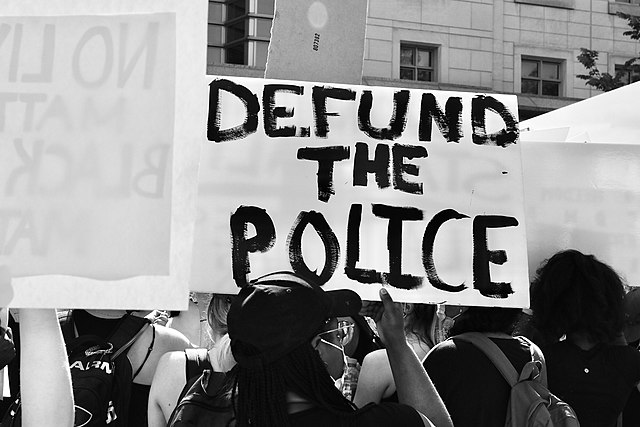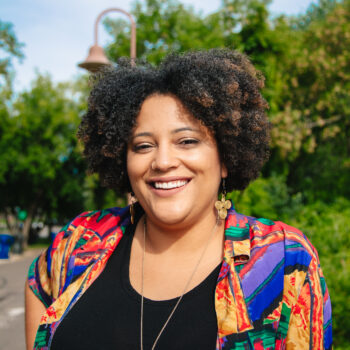Kayla Reed is the executive director of Action St. Louis, a grassroots organization founded after the Ferguson uprising, which leads campaigns to divest from carceral systems, fight for electoral justice, and invest in social programs like housing. Action St. Louis also led the successful campaign to Close the Workhouse prison in St. Louis. Reed sat down with Black Visions co-executive director Kandace Montgomery to talk about her work in St. Louis, the relationship between movements and organizations, how money complicates the work — and our duty to win. This interview has been edited and condensed.
What is your vision for safety that would replace policing and imprisonment?
In places like St. Louis, where we have a lot of violence, how do we radically re-imagine investment centering justice? That’s the dream. When I think about our campaign to close the jail, people often say, “Well, if there was no jail, where do people go?” And our answer is, “They go home.” They go to a place where they can have sustainability and stability, where their wellness is holistic. It’s not just measured by what they produce or what they earn. When we invest in that for the first time, because we’ve never done that in our communities, there’s less need, reliance, [or] desire for police. When people have what they need, there is less harm, and there is more space to create pathways for accountability that don’t rely on punitive solutions.
What is your assessment of the movement infrastructure that is needed to actually fight for this vision of real care for folks?
I didn’t come into movement as a builder. I was a pharmacy technician the day Mike Brown got killed, and I went to Ferguson. When there’s another instance of uprising, similar to Minneapolis last summer, a lot of folks are like, “Okay, St. Louis went through this. Let me call people we know.” And I try to be as honest as I can be. People are going to choose a side. They’re going to choose to do the movement building piece of it, or they’re going to choose to do the moment piece of it. The moment piece is: I’m in the streets for these two weeks, and then I’m gone. I’m away. Whatever happened in those streets impacted me, but I chose not to stay.
And then there are people who lean in. There are people who get baptized, and they’re like, “I want to be in the church. I want to be here. I joined. I’m ready. Put me where I need to go.” There are always less of those folks than the folks who were in the moment building. And for those folks who choose to be in the work of movement building after an uprising, I recommend that folks prioritize healing and deep relationship building because you’re going to be tried. Your leadership is going to be tried. Your development is going to be tried. Your relationships are going to be tried. And there’s so much trauma that comes out of those moments, that if we don’t take time to heal the foundation, what we build is always at risk of collapsing.
Do movements need organizations?
Oh, yeah. I am firmly in the church that there is no movement without strong organizations. Strong leaders build strong campaigns that build strong organizations that build strong movements. Organizations can’t be destroyed as easily as a leader. Now, I think how we define organization can be expansive — some form of people being organized in the same direction, with a commitment to a set of values and beliefs that guide their work. That can look like everything from a block unit to a national organization with chapters. But we have to have collectives because, if we don’t have collectives, then we run the risk of defining what the win looks like based on our personal positionality and our personal perception.
When you have a collective, you’re likely to understand more than one point of view, more than one lived experience, more than one analysis, and you’re able to identify the common threads and the tensions and the contradictions and struggle. I think about how important the intervention has been around queer and trans folks in this iteration of movement. If we didn’t have that intervention around who gets to lead movement and how movement is run and who we are fighting for when we say Black liberation, that movement will produce something akin to oppression for other folks. And so when we think of movement, we have to think about a constellation of organizations that are made up of different people who have different experiences and struggled to identify that vision together.
Especially coming out of uprising, there’s a surge of resources, and organizations are often pitted against each other. In all of that, we have to sustain ourselves. What is your advice for organizers on how they sustain themselves? And what lessons did you learn the hard way?
The first thing I tell people about money is, when it comes, you don’t have to make a decision right away. The thing that we can’t do is let money dictate our strategy. Money can expand our tactics, but it shouldn’t dictate our strategy. And money can’t be more important than relationships. It can’t be more important than political education. It can’t be more important than development. And if those things slow us down, I’d rather be slow and right than fast and wrong. The terms and conditions of movement building are [that we have] to be stewards of this movement, that we will do what is necessary to protect it. That means checking ourselves. That means checking each other. That means checking organizations. Stewards don’t destroy; stewards sustain. They remove what is bad and they add what is good, but they do not destroy.
We can’t conflate money and movement. And we’ve got to understand that if our movement is about the well-being of Black folks, then people should be paid to do this work. People should have what they need, and we should not sacrifice or overwork and under-resource folks who are in this movement because, as stewards, our responsibility is to sustain. And if we’re not creating an environment where folks are able to sustain themselves, they will not sustain movement. They will resent movement. And that is when destruction becomes the option.
A lot of money came into St. Louis. Certain groups got it; other groups didn’t. And that’s hard because we all were in the streets. And again, some people chose to moment build and others chose to movement build. But there was no process of healing. So, folks who didn’t have said, “I’m still here, so you don’t have to have money to be here, right? You shouldn’t have to be paid to do this work.” And people who had were saying, “I believe in this work, the money didn’t bring me here and people should be taken care of.” But they didn’t talk to each other.
If movement is about making the space, sustaining it long enough for people to be transformed in the work, we’ve got to make space to hold the bumpiness of that transformation. We can’t police it in a particular direction or force it to look a particular way. We’ve got to understand that there’s going to be tensions and contradictions and complications. And we have to have restorative, caring, and transformative grace as we pursue justice too.
It’s easy to move fast and then burn yourself out.
It’s so easy. I burnt out a few times. And there were people there to help me. There were people there to make space for me. And in those moments, that’s when I knew that liberation was possible. Because we’re going to mess up. We’re in this maze; we’re going to hit a wall. We’re going to run into each other. We’re going to try things that don’t make sense. We’re going to disagree. But if there is a commitment, if you click that box, you’ve got to keep coming back. And that’s a humbling process.
Social media continues to be a trickster to keep us from really building relationships.
That’s why organizations are key. The most impactful things I’ve said have never been in a 140 characters. And I know how important Twitter was to Ferguson. We got to tell our story. But we don’t build movement on Twitter. You can inspire people, but then you’ve got to move them. And when we move [someone] from liking something to signing up for something to attending something to becoming a member of an organization — in those spaces, that is where accountability lives. It lives between people who have relationships.
I think we have to start asking, “How does this serve the work?” Because if it’s truly about accountability, if it’s truly about transparency, if it’s truly about recalibrating to steward better, that can’t happen on Twitter. That’s not what Twitter is for. And if you are a real organizer, you wouldn’t use a tactic that wouldn’t help you produce the outcome that you wanted to see in the first place.
What’s being said but remains unheard?
You know what we say a lot in this movement? It is our duty to fight for our freedom. It’s a commitment that we make every single day. We keep saying it, but we haven’t heard the mandate in that. [It’s] our duty to win. Which means we can’t sacrifice what we have built for anything other than winning our freedom. That is the goal. I think the most important piece in that mandate is our. Our is plural. It is more than one. It is not my duty to fight for our freedom. It is ours. I cannot do it alone. We should not do it alone. And we will not win alone.


